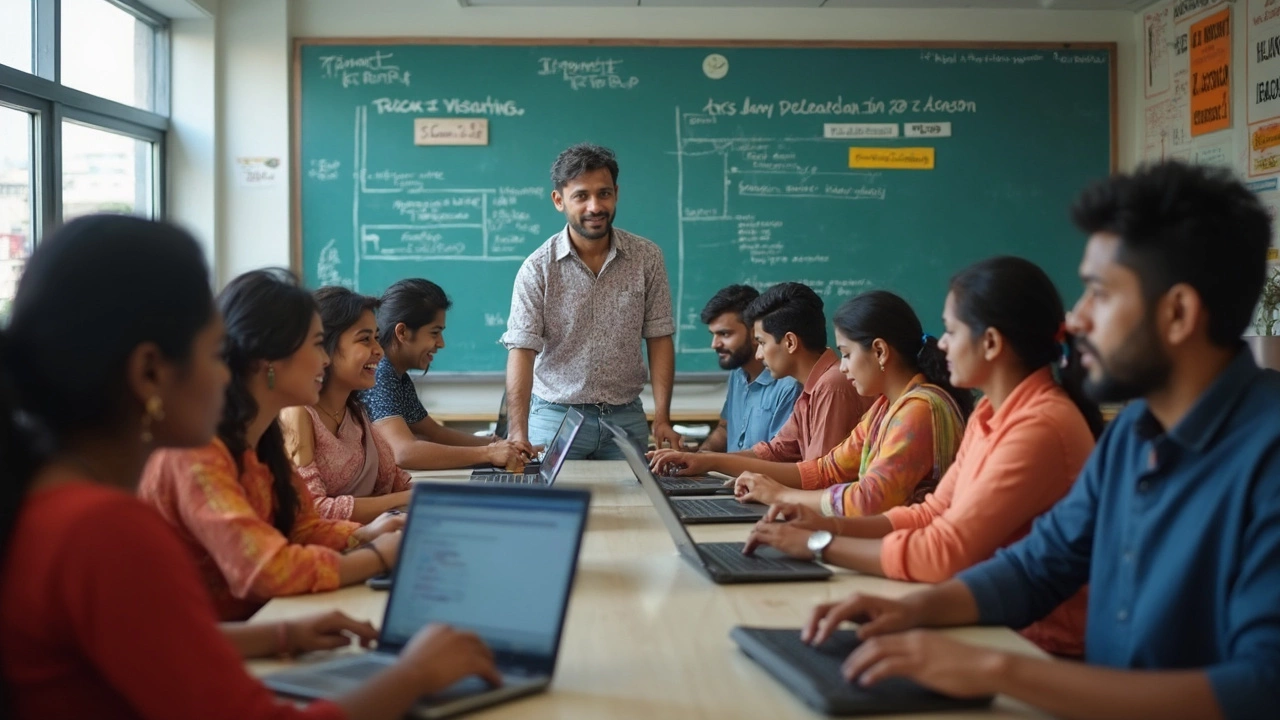Is 35 Too Old to Learn Coding? Real Talk for Would-Be Developers

Turns out, 35 is not some magical cut-off for learning how to code. In fact, plenty of folks are jumping in way past that age—and they’re doing just fine. It’s easy to scroll through stories about teenage prodigies cranking out apps, but that’s not the full picture in tech. More and more bootcamps and coding classes are packed with people who remember using dial-up Internet.
The biggest questions usually sound like this: Will I stand out? Will I keep up? Is anyone going to take me seriously? Here’s some good news. There’s actual data out there—like surveys from major bootcamps in the US—that shows people 30+ have solid graduation rates and land jobs in software just like their younger classmates. Even the big tech companies don’t have age limits for junior developer roles.
Before you even worry about algorithms, it’s actually your attitude that drives the learning curve. Having life experience is a secret weapon. You’ve probably worked through tougher stuff than debugging code, honestly.
- The 35-Year-Old Coding Student: The Facts
- What Changes When You Start Later?
- Mythbusting: Age in the Tech World
- Tips to Get the Ball Rolling
The 35-Year-Old Coding Student: The Facts
Plenty of people wonder if learning coding at 35 is even realistic. Here's what you should know: coding bootcamps are not just filled with twenty-somethings. According to a 2023 State of the Bootcamp Market report, roughly one quarter of all bootcamp students in the U.S. were over 30. Some schools even reported a surge in students ages 35 to 50. You're definitely not alone.
Graduation rates aren't scary, either. Bootcamp data shows that people in their 30s actually have comparable—or sometimes higher—completion rates compared to younger students. Why? Older students tend to treat their studies like a job. They're more focused and less likely to skip assignments or blow off practice.
Job placement is another big concern, but numbers from places like Springboard and General Assembly show that over 80% of graduates 30+ land developer jobs within six months. It does mean hustling for interviews, but younger grads don't magically get jobs without work, either.
If you look at tech meetups, you’ll spot newbies, career switchers, and parents sitting right next to recent college grads. There are even specialty Facebook groups just for people learning to code at 30, 40, or beyond. Nobody’s handing out scorecards based on age.
What might be tough? Juggling family, full-time work, or just remembering the last time you sat in a classroom. Those are real hurdles, but they're not deal-breakers if you plan ahead and set smart goals.
What Changes When You Start Later?
Kicking off your coding journey at 35 is different from when you're 18, but that’s not a bad thing. Older students bring their own set of strengths and, yeah, a few hurdles to clear. Here’s how things actually shake out when you’re not the youngest in the room anymore.
One big shift: priorities. Folks in their mid-30s and up usually have busy jobs, families, and mortgages in the mix. That means you’ll probably be carving out time for coding after dinner or during weekends. But—on the flip side—you’ve learned how to manage your calendar, get focused, and stick to goals, which is half the battle in any course.
Another thing? You know how to learn. You’ve picked up new skills at work or in daily life, so you’re no stranger to facing the unknown. Sure, maybe memorizing gets slower, but understanding how things fit together happens faster. Plenty of studies on adult learning back this up: adults are better at connecting new ideas with stuff they already know, and that goes a long way in tech.
Let’s get real about stamina. After a long day, it’s not easy to stare at code for hours. That’s why many learning coding at 35 students look for flexible programs or part-time bootcamps. The industry’s caught on—coding classes now offer evening tracks, self-paced videos, and even “study buddies” to help learners over 30 stick with it. Here’s a fresh stat from the 2024 Course Report Alumni Survey:
| Age Group | Bootcamp Graduation Rate | Employed as Developer Within 6 Months |
|---|---|---|
| Under 30 | 82% | 68% |
| 30-39 | 79% | 65% |
| 40 and up | 75% | 55% |
The gap’s there, but not wide enough to raise red flags. Success is more about keeping your eye on the prize and tapping into routines than anything else.
Here's what folks often find helpful when starting later:
- Set fixed “coding hours” so it doesn’t get lost in the daily shuffle.
- Pick courses built for working adults—think online, bite-sized lessons, or weekend meetups.
- Team up with other career-changers for support and motivation.
- Don’t waste time memorizing; focus on understanding concepts and practicing by building mini-projects.
Your life may be packed, but with the right approach, it’s possible to slot coding in—and actually stick with it.

Mythbusting: Age in the Tech World
Let’s squash the idea that tech is a young person’s game. The truth is, the tech industry has people with all sorts of backgrounds, and the age range is way wider than most folks think. Peek inside any decent-sized software company, and you’ll find twenty-somethings working right alongside those who started coding well after their thirties.
Here’s something solid: A 2023 Stack Overflow Developer Survey found that about 20% of respondents had started learning to code after age 30. That’s not a tiny slice—it means thousands of people worldwide are making the switch every year. Tech giants like Microsoft, Google, and IBM have teams full of people who changed careers later in life. Most hiring managers are looking for fresh problem-solving skills and persistence, not your birth year.
Let’s break down some stubborn myths:
- Myth: You’re too old to learn new tricks.
Fact: Studies show that people in their thirties and forties can pick up new skills just as fast, especially when they bring real-world experience to the table. - Myth: Employers want only young coders.
Fact: Companies care about results, not your graduation year. And legal protections in most places make age-based discrimination risky for employers. - Myth: Bootcamps are full of fresh college grads.
Fact: The major coding bootcamps in North America report their average student age is now between 30 and 35.
To add proof, check out this data from Flatiron School’s 2024 job outcomes report:
| Student Age Group | Job Placement Rate |
|---|---|
| Under 30 | 85% |
| 30-39 | 84% |
| 40+ | 79% |
So if you’re searching for learning coding at 35, the data straight up says it’s not only possible, but it’s happening—and working out—for lots of people right now.
Tips to Get the Ball Rolling
If you’re seriously thinking about learning coding at 35, the first step is ditching the idea that age itself is your biggest obstacle. Turns out, what you do with your time now matters a lot more. Here’s how you make a real start and keep the momentum.
Tech job reports and bootcamp stats tell us you don’t need to sprint—you need consistency. People who spend just 7 to 10 hours per week practicing see progress, even with zero background. Got a full-time job or a family? That’s normal for most adult learners in coding bootcamps.
- Pick the Right Language: If you want job security and clear examples, start with Python or JavaScript—they’re popular and beginner-friendly. For web work, JavaScript is everywhere. For automation and data jobs, Python rules the scene.
- Free Doesn’t Mean Low-Quality: Resources like freeCodeCamp, Mozilla, and The Odin Project offer step-by-step tracks. Many people land entry-level tech jobs using nothing but these free tools.
- Join a Community: Don’t go it alone. Studies from Stack Overflow show people who ask questions and join forums learn faster and feel less discouraged. Sites like Reddit’s r/learnprogramming or Discord coding groups are full of new learners your age (and older).
- Go Project-First: Don’t waste your time memorizing syntax. Pick a tiny project, like a personal website or a tool to automate something you hate doing. Building real stuff keeps you motivated and helps everything stick.
- Use Short Sprints: Adult brains love repetition, not cramming. Try 20-30 minute focused coding bursts, take a short walk, then repeat. Pomodoro timers are not just hype—they actually work for learning code.
If you’re curious about other people’s timelines, check out this recent table from one of the bigger online bootcamps. It shows how fast folks from different backgrounds picked up key coding skills:
| Background | Average Weeks to Finish First Project | % Who Kept Learning After 6 Months |
|---|---|---|
| No Tech Experience (Age 30+) | 8 | 72% |
| No Tech Experience (Under 30) | 7 | 68% |
| Tech Background (Any Age) | 5 | 85% |
See? The difference isn’t huge. The key: pick a routine, lean on other learners, and actually build things. Ignore the noise—you’re not too late. You just need to get started and let consistency do its thing.
Write a comment